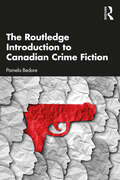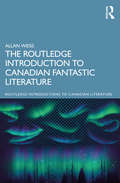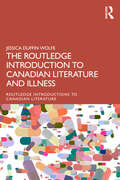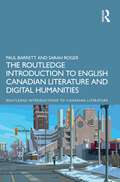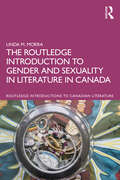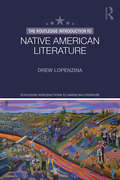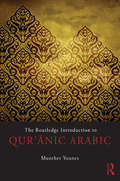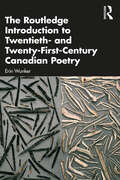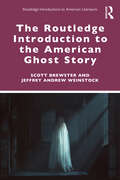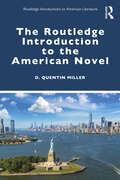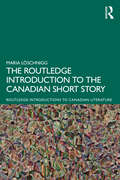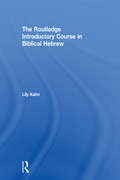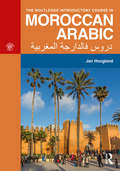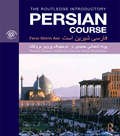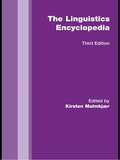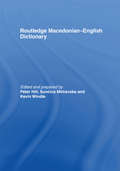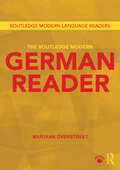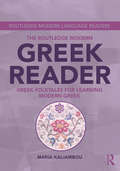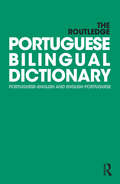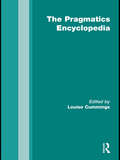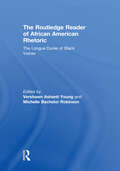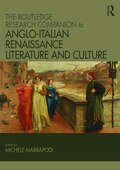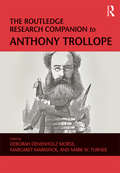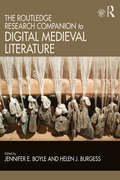- Table View
- List View
The Routledge Introduction to Canadian Crime Fiction
by Pamela BedoreWho are the most important Canadian crime and detective writers? How do they help represent Canada as a nation? How do they distinguish Canada’s approach to questions of crime, detection, and social justice from those of other countries? The Routledge Introduction to Canadian Crime Fiction provides a much-needed investigation into how crime and detection have been, are, and will be represented within Canada’s national literature, with an attention to contemporary popular and literary texts. The book draws together a representative set of established Canadian authors who would appear in most courses on Canadian crime and detective fiction, while also introducing a few authors less established in the field. Ultimately, the book argues that crime fiction is a space of enormously productive hybridity that offers fresh new approaches to considering questions of national identity, gender, race, sexuality, and even genre.
The Routledge Introduction to Canadian Fantastic Literature (Routledge Introductions to Canadian Literature)
by Allan WeissThis study introduces the history, themes, and critical responses to Canadian fantastic literature. Taking a chronological approach, this volume covers the main periods of Canadian science fiction and fantasy from the early nineteenth century to the first decades of the twenty-first century. The book examines both the texts and the contexts of Canadian writing in the fantastic, analyzing themes and techniques in novels and short stories, and looking at both national and international contexts of the literature’s history. This introduction will offer a coherent narrative of Canadian fantastic literature through analysis of the major texts and authors in the field and through relating the authors’ work to the world around them.
The Routledge Introduction to Canadian Literature and Illness (Routledge Introductions to Canadian Literature)
by Jessica Duffin WolfeThe Routledge Introduction to Canadian Literature and Illness considers the key literary and historical frameworks for reading stories about sickness. Transcending disciplinary boundaries, this book analyzes narrative depictions of major epidemics, disastrous injuries, mental and maternal health, medical assistance in dying, and the curative effects of decolonization. This accessible and engaging guide illustrates how illness, encompassing states of physical and mental disorder, injury, and disruption, provides structure and focus to many of the most significant works of English narrative published in Canada. Giving distinct consideration to Indigenous authors who may or may not identify as Canadian and whose representations of illness reflect centuries of colonial violence, this volume offers timely resources to think critically and originally about the Canadian canon for fruitful classroom discussion. Students of both literature and health humanities will find that this book deepens their understanding of literary portrayals of illness and the impact of narrative on concepts of affliction and healing.
The Routledge Introduction to English Canadian Literature and Digital Humanities (Routledge Introductions to Canadian Literature)
by Paul Barrett Sarah RogerThe Routledge Introduction to English Canadian Literature and Digital Humanities is a guide to the concepts and theories at the intersection of Canadian literary studies and digital humanities (DH). Equal parts theoretical and practical, it focuses on debates that overlap the two domains. This book historicizes the connections between the two by surveying the history of DH in Canada, the tradition of Canadian writers engaging with technology, and DH analyses of Canadian literature. It also situates both CanLit and DH with respect to contemporary concerns about alterity, and it demonstrates how digital technologies allow writers and scholars to intervene in them.This book complements its theoretical discussions with a practical introduction to DH methods. Using Canadian literary texts and examples from projects at the intersection of CanLit and DH, it introduces key DH approaches to novice readers. Topics covered include data collection, data management, and textual analysis, as well as essential DH tools and the Python programming language. A concluding case study guides readers interested in applying the ideas presented throughout.
The Routledge Introduction to Gender and Sexuality in Literature in Canada (Routledge Introductions to Canadian Literature)
by Linda M. MorraThe Routledge Introduction to Gender and Sexuality in Literature in Canada charts the evolution of gender and sexuality, as they have been represented and performed in the literatures of Canada for more than three centuries. From early colonial texts by Frances Brooke, to settler texts by Susanna Moodie and Catherine Parr Traill, to more contemporary texts by Jane Rule, Alice Munro, Joshua Whitehead, Ivan Coyote, and others, this volume will introduce readers to how gender and sexuality have been variably conceived in Canada and the work they perform across multiple genres. Calling upon recent currents of gender theory and examining the composition, structure, and history of selected literary texts—that is, the “literary sediments” that have accumulated over centuries—readers of this book will explore how those representations shift over time. By examining literature in Canada in relation to crucial cultural, political, and historical contexts, readers will better apprehend why that literature has significantly transformed and broadened to address racialized and fluid identities that continue to challenge and disrupt any stable notion of gendered and sexualized identity today.
The Routledge Introduction to Native American Literature (Routledge Introductions to American Literature)
by Drew LopenzinaThis Introduction makes available for both student, instructor, and affcianado a refined set of tools for decolonizing our approaches prior to entering the unfamiliar landscape of Native American literatures. This book will introduce indigenous perspectives and traditions as articulated by indigenous authors whose voices have been a vital, if often overlooked, component of the American dialogue for more than 400 years. Paramount to this consideration of Native-centered reading is the understanding that literature was not something bestowed upon Native peoples by the settler culture, either through benevolent interventions or violent programs of forced assimilation. Native literature precedes colonization, and Native stories and traditions have their roots in both the precolonized and the decolonizing worlds. As this far-reaching survey of Native literary contributions will demostrate, almost without fail, when indigenous writers elected to enter into the world of western letters, they did so with the intention of maintaining indigenous culture and community. Writing was and always remains a strategy for survival.
The Routledge Introduction to Qur'anic Arabic
by Munther YounesThe Routledge Introduction to Qur’ānic Arabic is an innovative, text-based, language course designed for students interested in acquiring a foundation in Qur’ānic and Classical Arabic. Focused on enhancing comprehension and vocabulary acquisition, the book contains 40 lessons designed to be covered in about 40 hours of classroom instruction. Starting with the shorter sūras of the Qur’ān, such as al-Fatiha and those of the Juz’ ‘Amma, it utilizes their recurring vocabulary and grammatical structures to build a stable linguistic foundation for learners before moving on to more challenging and longer sūras such as Yāsīn, Maryam and Yūsuf. Although the book is primarily designed for classroom use, the vocabulary and structures of the short sūras, the accompanying audio recordings, and the activities found throughout the book will also be helpful for independent learners. The only prerequisite is knowledge of the Arabic writing system. The audio material, which is available on the Routledge website, helps learners improve their pronunciation of individual sounds and develop their skills to syllabify Arabic words and phrases correctly in order to approximate that of native speakers. Also available on the website are answer keys to exercises and transcriptions of the audio material. Written by an experienced teacher, The Routledge Introduction to Qur’ānic Arabic is an essential guide for instructors, students and anyone interested in developing their knowledge of Qur’ānic Arabic.
The Routledge Introduction to Twentieth- and Twenty-First-Century Canadian Poetry (Routledge Introductions to Canadian Literature)
by Erin WunkerWhen asked the question "what is the power of poetry?," writer Ian Williams said "poetry punctures the surface." Williams' statement—that poetry matters and that it does something—is at the heart of this book. Building from this core idea that poetry perforates the everyday to give greater range to our lives and our thinking, the practical and pedagogical aim of this book is twofold: the first aim is to provide students with an introduction to the key cultural, political, and historical events that inform twentieth- and twenty-first-century Canadian poetry; and to familiarize those same readers with poetic movements, trends, and forms of the same time period. This book addresses the aesthetic and social contexts of Canadian poetry written in the twentieth and twenty-first centuries: it models for its readers the critical and theoretical discourses needed to understand the contexts of literary production in Canada. Put differently, readers need a sense of the "where" and "how" of poetic production to help situate them in the "what" of poetry itself. In addition to offering a historically contextualized overview of the significant movements, developments, and poets of this time period, this book also familiarizes readers with key moments of reflection and rupture, such as the effects of economic and ecological crisis, global conflicts, and debates around appropriation of culture. This book is built on the premise that poetry in Canada does not happen outside of political, social, and cultural contexts.
The Routledge Introduction to the American Ghost Story (Routledge Introductions to American Literature)
by Jeffrey Andrew Weinstock Scott BrewsterThis book traces the historical development of the American ghost story from its Indigenous, Puritan, and Enlightenment origins to its heyday in the nineteenth century and continued vibrancy in modern literary and visual culture. It explores the main tropes, thematic preoccupations, principal settings, and stylistic innovations of literary ghost stories in the United States, and the ghost story’s rich afterlife in cinema, television, and digital culture. Throughout, the role played by ghost stories in nation-building, and the questions these tales raise about race, class, sexuality, religion, and science, will be examined. The book examines major practitioners in the field, such as Nathaniel Hawthorne, Washington Irving, Shirley Jackson, Henry James, Stephen King, Toni Morrison, Joyce Carol Oates, and Edith Wharton, alongside prominent ghost narratives in cinematic, televisual, and online form, including podcasts, gaming, and ghost-hunting apps. This study also gives a new prominence to neglected or less familiar authors, including BIPOC writers, who have helped to shape the American ghost story tradition.
The Routledge Introduction to the American Novel (Routledge Introductions to American Literature)
by D. Quentin MillerThe Routledge Introduction to the American Novel provides a comprehensive and engaging guide to this cornerstone literary genre, reframing our understanding of the American novel and its evolving traditions. This volume aims to engage productive classroom discussion, including: What differentiates the American novel from its European predecessors and traditions from other parts of the world? How have the related myths of the American Dream and the Great American Novel affected understanding of the tradition over time? How do American novels by or about women, racial and ethnic minorities, immigrants, and members of lower social classes challenge the American cultural monomyth? How do experimental novels and eco-conscious novels alter the American novel tradition? Rethinking historical trends and debates surrounding the American novel, this text delivers a persuasive case for why it’s important to reevaluate the American novelistic tradition. The Routledge Introduction to the American Novel offers a much-needed update to the history and future of this literary form.
The Routledge Introduction to the Canadian Short Story (Routledge Introductions to Canadian Literature)
by Maria LöschniggThis volume aims to introduce undergraduates, graduates, and general readers to the diversity and richness of Canadian short story writing and to the narrative potential of short fiction in general. Addressing a wide spectrum of forms and themes, the book will familiarise readers with the development and cultural significance of Canadian short fiction from the early 19th century to the present. A strong focus will be on the rich reservoir of short fiction produced in the past four decades and the way in which it has responded to the anxieties and crises of our time. Drawing on current critical debates, each chapter will highlight the interrelations between Canadian short fiction and historical and socio-cultural developments. Case studies will zoom in on specific thematic or aesthetic issues in an exemplary manner. The Routledge Introduction to the Canadian Short Story will provide an accessible and comprehensive overview ideal for students and general readers interested in the multifaceted and thriving medium of the short story in Canada.
The Routledge Introductory Course in Biblical Hebrew
by Lily KahnThe Routledge Introductory Course in Biblical Hebrew provides a comprehensive introduction to Biblical Hebrew language and texts. Combining a fresh and innovative approach with an in-depth treatment of the language, it presents the essentials of biblical grammar and vocabulary in an engaging and systematic way. Unlike other Biblical Hebrew courses, it is structured around a series of vibrant and memorable stories, with each story reinforced by grammar explanations, supportive exercises, and a concluding genuine biblical text. This coherent focus encourages students to engage with the text actively and facilitate their mastery of the language to the full. Features include: Forty units covering all the topics expected in a first-year Biblical Hebrew course, including the Hebrew writing system, pointing rules, nouns and adjectives, parsing, mastery of strong and weak verb paradigms and full attention to syntax Clear and detailed grammar explanations supported by plentiful examples An extensive assortment of varied and stimulating exercises designed to reinforce new grammar and develop students’ ability to use Biblical Hebrew actively Incorporation of a wide range of genuine biblical texts to familiarise students with the main biblical narrative cycles and to equip them with the ability to read authentic material from the earliest stages of learning A free companion website (www.routledge.com/cw/kahn) offering a wealth of additional instructor and student resources, including many extra exercises and biblical texts, flashcards to test knowledge, a vocabulary guide listing words by part of speech, a full answer key, translations of all the stories and biblical texts, a sample syllabus, coursework assignments covering the entire contents of the course and audio recordings of the stories and biblical texts Coherent chapter organisation to consolidate and reinforce learning consistently at each step of the course Grammar summary, two-way glossary and subject index presented at the back of the book for easy access A user-friendly text design with original illustrations and clear presentation of the Hebrew script Written by an experienced instructor and extensively trialled at UCL, The Routledge Introductory Course in Biblical Hebrew will be an essential resource for all students beginning to learn Biblical Hebrew.
The Routledge Introductory Course in Moroccan Arabic
by Jan HooglandThe Routledge Introductory Course in Moroccan Arabic is ideal for both class-based and independent learners. No prior knowledge of Arabic is required as the course guides you step-by-step through the essentials of the language. Transliteration is used throughout to provide learners with an accurate representation of this spoken language while Arabic script is provided from Part II for those who have prior knowledge of Arabic. Part I introduces the phonology of Moroccan allowing you to recognise and pronounce the sounds unique to Moroccan. The basic grammar of Moroccan is also presented here ensuring students have a solid foundation on which to build their communicative skills. Part II is arranged thematically and equips you with the vocabulary and cultural information needed to communicate effectively in Morocco in a range of common situations. By the end of the course learners will have reached the CEFR A2 level/ACTFL Intermediate-Mid.
The Routledge Introductory Persian Course: Farsi Shirin Ast
by Dominic Parviz Brookshaw Pouneh Shabani-JadidiThe Routledge Introductory Persian Course: Farsi Shirin Ast is an innovative Persian language course designed both for undergraduate and postgraduate students who are new to the language. Focusing both on grammatical and communicative competence, the course contains 15 lessons combining authentic dialogues and texts with grammar explanations, exercises and audio materials to guide and support the student through the key skills of reading, writing, speaking and listening. Key features: lively, content-based materials – the language is taught and practiced through a variety of dialogues and texts on the culture, history, and traditions of Iran complete vocabulary lists – each vocabulary entry contains the English meaning, the part of speech in Persian, as well as a sample sentence in Persian colloquial situational dialogues – students are introduced to spoken Persian from the outset carefully controlled exercises – new grammatical points are practiced in a variety of controlled exercises that bridge between students’ existing information and the new information audio material – students can develop natural pronunciation by imitating the audio recordings of the vocabulary, dialogues, and texts available freely on the companion website glossaries – comprehensive Persian to English and English to Persian glossaries. The Routledge Introductory Persian Course: Farsi Shirin Ast provides everything that students and instructors need for an engaging and effective learning environment. Pouneh Shabani Jadidi is Head of the Persian Language Program and Faculty Lecturer in Persian at the Institute of Islamic Studies, McGill University, Montreal, Canada. Dominic Parviz Brookshaw is Lecturer in Persian Studies and Iranian Literature at the University of Manchester, UK.
The Routledge Linguistics Encyclopedia
by Kirsten MalmkjaerThe Routledge Linguistics Encyclopedia is a single-volume encyclopedia covering all major and subsidiary areas of linguistics and applied linguistics. The 79 entries provide in-depth coverage of the topics and sub-topics of the field. Entries are alphabetically arranged and extensively cross-referenced so the reader can see how areas interrelate. Including a substantial introduction which provides a potted history of linguistics and suggestions for further reading, this is an indispensable reference tool for specialists and non-specialists alike. This third edition has been thoroughly revised and updated, with new entries on: attitudes to language conversation analysis English Language Teaching gesture and language idioms language and advertising language and new technologies linguistics in schools optimality theory research methods in linguistics slang. The following entries have been recommissioned or substantially revised: Animals and Language, Artificial Languages, Computational Linguistics to Language Engineering, Contrastive Analysis/Contrastive Linguistics, Corpus Linguistics, Critical Discourse Analysis, Dialectology, Discourse Analysis, Dyslexia, Genre Analysis, Historical Linguistics, Intonation, Language and Education, Language, Gender and Sexuality, Language Origins, Language Surveys, Language Universals, Linguistic Typology, Metaphor, Pragmatics, Rhetoric, Semantics, Semiotics, Sociolinguistics, Stylistics, Systemic-Functional Grammar, Writing Systems.
The Routledge Macedonian-English Dictionary
by Peter Hill; Sunčica Mirčevska; Kevin WindleCompiled by Reginald de Bray, Todor Dimitrovski, Blagoja Korubin and Trajko Stamatoski Edited and prepared for publication by Peter Hill, Suncica Mircevska and Kevin Windle, at the Australian National University The Macedonian-English Dictionary is the essential aid to all work involving the two languages. The Dictionary is the most ambitious record to date to record English equivalents for the vocabulary of modern Macedonian. It covers the vocabulary met with in a wide variety of settings and literary forms, from modern urban life to traditional folk poetry. Features include: * 50,000 headwords * clear, accurate examples of usage * all necessary grammatical information for Macedonian headwords * details of stress, where it departs from the regular pattern * a broad range of idiomatic expressions and proverbs. The work is based on the lexical corpus of the renowned Rechnik na makendonskiot jazik. Prepared by scholars at the Australian National University in Canberra, working in collaboration with the compilers of the original Rechnik, the content has been brought up to date by the addition of many newer words and new senses which have arisen for older words.
The Routledge Modern German Reader (Routledge Modern Language Readers)
by Maryann OverstreetThe Routledge Modern German Reader is designed for intermediate and advanced learners of German. It provides a clear and engaging introduction to reading authentic German language texts for learners who wish to move beyond elementary course material to more rewarding works of fiction and non-fiction.Features include: twenty-eight readings, graded according to difficulty, beginning with shorter, simpler texts and progressing to longer, more complex texts fourteen literary texts, written by well-known writers from German-speaking countries, on universal themes and fourteen non-literary texts from magazines, newspapers and the internet, featuring a range of engaging topics relating to culture, society and history varied, contextualized pre- and post- reading exercises designed to stimulate discussion, develop comprehension strategies, expand and refine vocabulary, and foster awareness of grammatical structures as they occur in authentic contexts a German-English glossary with separate vocabulary lists for each chapter and a complete answer key available at www.routledge.com/products/9781138898035 Suitable for both classroom use and independent study, The Routledge Modern German Reader provides insights into the culture of German-speaking countries while also acting as a stimulus to further independent reading. It is an essential tool for developing vocabulary and increasing reading proficiency.
The Routledge Modern Greek Reader: Greek Folktales for Learning Modern Greek
by Maria KaliambouThe Routledge Modern Greek Reader has been specially designed for post-beginners to advanced learners of Greek. Written by an experienced instructor, this innovative reader offers both students and teachers of Modern Greek the pedagogical tools to utilise richly textured folktale material in a language class. Students can develop their linguistic skills while simultaneously engaging with the broader social and cultural context of the language. Features include: Twenty five readings organised according to level of difficulty, beginning with easy short stories and progressing onto more advanced level texts Vocabulary lists with English translations and vocabulary in context supporting each reading Comprehension questions in each chapter to help foster stronger reading and writing skills Language exercises and subject specific tasks to stimulate classroom discussion and help students develop strong essay writing skills in Greek Three folktales presented in different dialects at the end of the book to help students understand variety within the Greek language itself A complete Greek-English glossary and a list of all idiomatic expressions and colloquial phrases found in the folktales. Suitable for both class use and independent study, The Routledge Modern Greek Reader is an essential tool for increasing language proficiency skills and enriching students’ cultural knowledge.
The Routledge Portuguese Bilingual Dictionary: Portuguese-English and English-Portuguese (Routledge Bilingual Dictionaries)
by Maria AllenRevised 2014 ReprintThoroughly revised in 2014, this compact and up-to-date two-way dictionary provides a comprehensive and modern vocabulary. It is the ideal reference for all users of Portuguese.The dictionary includes an extensive coverage of practical terminology from a diversity of fields including; business and economics, law, medicine and information technology as well as common abbreviations, toponyms (place names), nationalities, numerous idiomatic expressions and slang. Key features: Completely up-to-date reflecting the recently-agreed orthographic changes between Brazil and Portugal. Definitions and differences in both variants clearly signposted. Brazilian Portuguese vocabulary where it differs from European-African Portuguese and some American English terms. Coverage of colloquial and slang registers. Useful notes on grammatical points and false friends, as well as boxes with cultural knowledge relating to the U.K., U.S.A., Brazil, Portugal and the other Portuguese-speaking countries. The Routledge Portuguese Bilingual Dictionary provides the maximum information in the minimum space, making it an invaluable reference source
The Routledge Pragmatics Encyclopedia
by Louise CummingsFirst Published in 2009. Routledge is an imprint of Taylor & Francis, an informa company.
The Routledge Reader of African American Rhetoric: The Longue Duree of Black Voices
by Vershawn Ashanti Young Michelle Bachelor RobinsonThe Routledge Reader of African American Rhetoric is a comprehensive compendium of primary texts that is designed for use by students, teachers, and scholars of rhetoric and for the general public interested in the history of African American communication. The volume and its companion website include dialogues, creative works, essays, folklore, music, interviews, news stories, raps, videos, and speeches that are performed or written by African Americans. Both the book as a whole and the various selections in it speak directly to the artistic, cultural, economic, gendered, social, and political condition of African Americans from the enslavement period in America to the present, as well as to the Black Diaspora.
The Routledge Research Companion to Anglo-Italian Renaissance Literature and Culture
by Michele MarrapodiThe aim of this Companion volume is to provide scholars and advanced graduate students with a comprehensive and authoritative state-of-the-art review of current research work on Anglo-Italian Renaissance studies. Written by a team of international scholars and experts in the field, the chapters are grouped into two large areas of influence and intertextuality, corresponding to the dual way in which early modern England looked upon the Italian world from the English perspective – Part 1: "Italian literature and culture" and Part 2: "Appropriations and ideologies". In the first part, prominent Italian authors, artists, and thinkers are examined as a direct source of inspiration, imitation, and divergence. The variegated English response to the cultural, ideological, and political implications of pervasive Italian intertextuality, in interrelated aspects of artistic and generic production, is dealt with in the second part. Constructed on the basis of a largely interdisciplinary approach, the volume offers an in-depth and wide-ranging treatment of the multifaceted ways in which Italy’s material world and its iconologies are represented, appropriated, and exploited in the literary and cultural domain of early modern England. For this reason, contributors were asked to write essays that not only reflect current thinking but also point to directions for future research and scholarship, while a purposefully conceived bibliography of primary and secondary sources and a detailed index round off the volume.
The Routledge Research Companion to Anthony Trollope
by Deborah Denenholz Morse Margaret Markwick Mark W. TurnerBringing together leading and newly emerging scholars, The Routledge Research Companion to Anthony Trollope offers a comprehensive overview of Trollope scholarship and suggests new directions in Trollope studies. The first volume designed especially for advanced graduate students and scholars, the collection features essays on virtually every topic relevant to Trollope research, including the law, gender, politics, evolution, race, anti-Semitism, biography, philosophy, illustration, aging, sport, emigration, and the global and regional worlds.
The Routledge Research Companion to Anthony Trollope
by Deborah Denenholz Morse Margaret Markwick and Mark W. TurnerBringing together leading and newly emerging scholars, The Routledge Research Companion to Anthony Trollope offers a comprehensive overview of Trollope scholarship and suggests new directions in Trollope studies. The first volume designed especially for advanced graduate students and scholars, the collection features essays on virtually every topic relevant to Trollope research, including the law, gender, politics, evolution, race, anti-Semitism, biography, philosophy, illustration, aging, sport, emigration, and the global and regional worlds.
The Routledge Research Companion to Digital Medieval Literature
by Jennifer E. Boyle Helen J. BurgessWorking across literature, history, theory and practice, this volume offers insight into the specific digital tools and interfaces, as well as the modalities, theories and forms, central to some of the most exciting new research and critical, scholarly and artistic production in medieval and pre-modern studies. Addressing more general themes and topics, such as digitzation, media studies, digital humanities and "big data," the new essays in this companion also focus on more than twenty-five keywords, such as "access," "code," "virtual," "interactivity" and "network." A useful website hosts examples, links and materials relevant to the book.
